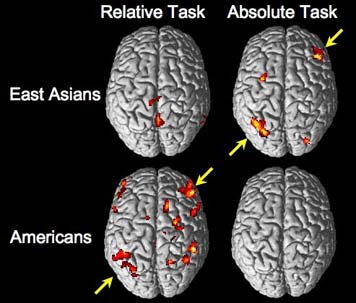There is neuro-cultural evidence supporting the two definitions of self-construals first proposed by Markus and Kitayama (e.g., independent and interdependent, 1991). Neuro-cultural research of self uses neuroscience and imaging techniques to describe and understand the biological processes that underlie our understanding of self (Chiao, Harada, Komeda, Li, Mano, Saito….2009; Zhu, Zhang, Fan, & Hana, 2007). One of the more common methods of determining brain areas that pertain to different cognitive processes is by using Functional Magnetic Resonance Imaging (fMRI) which measures blood flow in the brain. Areas with higher blood flow on fMRI scans are said to be activated. Chiao, et al., (2009) using fMRI results identified individualistic and collectivistic views of self in samples of Japanese and American students.

Chiao and colleagues (2009) found that participants who viewed themselves collectivistically showed greater fMRI activation in the medial prefrontal cortex (MPFC) than those who viewed themselves individualistically. The reverse is true when people describe themselves individualistically but these results were not clearly associated with specific cultures (e.g., Japan and United States). As described by the researchers, “cultural values and not necessarily their cultural affiliation” modulated the neural responses in their brains.

